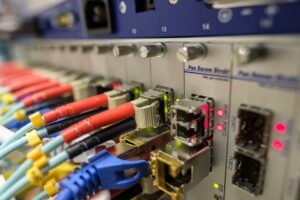 While we are not an Internet Service Provider (ISP), we frequently get questions from our clients about whether they should switch from DSL or cable internet to a fiber connection. There are a growing number of ISPs providing fiber connections in Southern Minnesota, so the option is available for many area businesses.
While we are not an Internet Service Provider (ISP), we frequently get questions from our clients about whether they should switch from DSL or cable internet to a fiber connection. There are a growing number of ISPs providing fiber connections in Southern Minnesota, so the option is available for many area businesses.
Different businesses have different needs in terms of bandwidth and speed, so there is no one-size-fits all approach. Fiber is not yet ubiquitous in our market and there are costs associated with switching. You should talk with your IT team or a representative from your ISP about how your business uses the internet to determine what connection speeds are right for your business. If all you do is email and browse the web, you might not need much. If you’re a graphic design firm constantly uploading large image files to send to clients, you’re going to want something more robust.
MCT uses fiber in our office and we have seen obvious benefits. Members of our team sometimes work from home by remotely controlling computers in the office and the faster fiber connection has made the experience far more dependable and smooth. That translates directly to increased productivity – we don’t find ourselves waiting for our computers to respond to clicks, and we get work done faster.
There are a number of benefits to fiber internet, including:
Speed
Fiber connections are capable of substantially faster speeds than DSL and cable technology. In particular, fiber lines offer much faster upload speeds, which are important for businesses that send large files out of their office to other locations.
Reliability
Fiber lines are more resistant to inclement weather conditions and interference than the traditional copper cabling used for DSL and cable.
Dedicated Bandwidth
If you have DSL or cable, you may find that your internet slows down at certain times of the day. That is because you can be affected by other people in your neighborhood who are essentially sharing some of your bandwidth. Fiber connections are dedicated, meaning that if they tell you you’re going to get 100 down and 10 up, you’re actually going to get it.
Less Latency
Latency refers to delays that occur while you are accessing the internet. In a business setting, latency can mean slow remote connections or perhaps most importantly, problems using VoIP phone systems. If you have a VoIP phone system and find that sometimes calls get choppy or people have a hard time hearing you, there’s a good chance latency is to blame. Fiber connections have a lower latency and are less susceptible to these problems.
We always recommend that our clients have an internet connection that meets their needs, and for many of them that means a fiber connection. Faster internet should be viewed as a productivity tool and an investment that ultimately adds to your bottom line. If you are unsure what your business should have for internet, call Mankato Computer Technology today for a consultation.